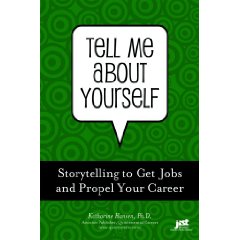It’s probably pretty typical for authors to immediately second-guess what they’ve written in their books and be champing at the bit to revise as soon as the book is published.
I wish I’d been more original with Tell Me About Yourself: Storytelling to Get a Job and Propel Your Career.
For example, the standard story formula for job-interview stories has long been Situation –> Action –> Result (or Problem –> Action –> Result or Challenge –> Action –> Result), and that’s pretty much what I presented in the book.
Gerry Lantz was the first to open my eyes to the notion that the SAR/PAR/CAR structure might be a bit ho-hum, and perhaps something more compelling was possible. He suggested structuring the story around the question “What’s at stake?”
Even though I found a good example of a What’s at Stake? story in Tell Me About Yourself, I admit that I had not totally wrapped my head around the concept.
But it became clearer to me when I read a blog entry by James Shelley. In turn, it was Shelley’s citation of Robert McKee’s seminal Story that helped me see the light. McKee writes:
What is the risk? What does the protagonist stand to lose if he does not
get what he wants? More specifically, what’s the worst thing that will happen to the protagonist if he does not achieve his desire? If this question cannot be answered in a compelling way, the story is misconceived at its core. For example, if the answer is: “Should the protagonist fail, life would go back to normal,” this story is not worth telling. What the protagonist wants is of no real value, and a story of someone pursuing something of little or no value is the definition of boredom.
McKee’s “What is the risk?” is pretty much the same as Lantz’s “What’s at stake?”
When applying this question to a job-interview story, it usually works better to ask the question, “What does the protagonist’s employer stand to lose if it does not get what it wants?” What would have happened to the employer if the protagonist had not increased sales or cut costs or solved some trenchant problem? What would have happened if the protagonist had not been there to act?
Shelley goes on to say, “True risk deals with issues of ‘life and death’ importance…” In a job-search story, the risk usually won’t be life-and-death (unless the job-seeker is, say, a medical professional, firefighter, police officer or the like). But the life or death of the job-seeker’s employer could be at stake.
Here’s an example from Tell Me About Yourself in which the employing company (which was the protagonist’s father’s firm) would probably have gone under had the protagonist not acted:
Two summers ago my father, who was the backbone of my family, had a massive stroke and was left partially paralyzed. This happened just a few short months before I was supposed to start attending college, and at the time I didn’t know if I ever would go to school. My dad put me in charge of his online business, which I had known very little about. I turned into the sole provider for my family overnight. I spent my days on the computer by my father’s hospital bed, very thankful that I could work and still stay by his side. My father kept getting better and better and eventually went back to work for himself. In a very short time, I realized that taking care of your family is the most important thing you can do, and to do so, you need to work hard and succeed so that you can provide them with everything they need.
Footnote: Shelley’s post also captures why storytelling is effective in the job search — because the audience for the story — the hiring decision-maker — becomes invested in the storyteller. The listener cares about the storyteller. “The stories you love the most are stories that literally seem to suck you in because you start caring for the things that the characters care about,” Shelley writes. He then quotes Jack Hodgins from Passion for Narrative:
We become involved in people’s lives when we care about them, and we begin to care about them when we understand what it is they hope for. Then we are put in the position of cheering them on, tensing on their behalf, getting impatient to discover whether they succeed.
